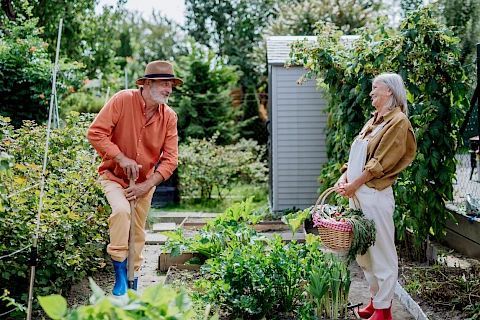
Gardening is more than just planting seeds and watching them grow. For older adults, it's a fantastic way to connect with others and stay active. Social connections are vital for seniors' well-being, helping reduce feelings of loneliness and providing support. Gardening, with all its benefits, offers a perfect avenue for making new friends while nurturing plants.
The Social Benefits of Gardening
Joining a gardening group opens doors to building friendships and a sense of community. Working together in a garden creates a shared experience that fosters connections. Gardening in a group encourages regular interaction and cooperation, leading to strong, lasting friendships. It's a great way to meet others with similar interests. Many seniors face isolation, but gardening with a group helps combat this. Sharing conversations over weeding or watering plants can significantly reduce feelings of loneliness. Gardening is an activity that many enjoy, regardless of age. Seniors can connect with younger generations, sharing tips, stories, and techniques that enrich their lives.
The Therapeutic Benefits of Gardening
Gardening is not only a social activity but also offers significant therapeutic benefits for both the body and mind.
Physical Health Benefits
Gardening involves a range of physical activities, like digging, planting, and watering, which provides mild to moderate exercise. Enjoying the fresh air and sunlight can improve physical health and overall mood.
Mental Health Benefits
Gardening is known for reducing stress and promoting relaxation. The satisfaction of seeing plants grow and bloom brings a sense of accomplishment that boosts mental well-being.
Cognitive Benefits
Tending a garden requires planning and problem-solving, which helps keep the mind sharp. Activities like remembering planting schedules or the names of different plants can improve memory and provide mental stimulation.
How to Start a Gardening Group
Starting a gardening group may seem daunting, but it's easier than you might think. Here's how you can go about it.
Finding Interested Members
Look for neighbors who enjoy gardening. You can visit local community centers or search online forums dedicated to gardening to find like-minded individuals.
Choosing a Suitable Location
Decide on a location that works for everyone. Community gardens, personal backyards, or local parks are excellent choices.
Planning and Organizing
Set up regular meetings and activities. Having consistent schedules ensures that everyone remains committed and looks forward to the gatherings.
Tips for Successful Gardening Groups
To keep the group thriving and enjoyable, consider these useful tips.
Setting Common Goals
Decide on shared projects like creating flower beds or vegetable patches. Common goals provide a sense of purpose and teamwork.
Sharing Knowledge and Resources
Encourage members to share gardening tips, seeds, or tools. A seed swap or tool-sharing initiative can help everyone get what they need without extra expense.
Incorporating Social Activities
Arrange for occasional potluck meals or garden tours. These social activities add a fun element to the gatherings and help foster deeper connections.
Senior Helpers Nashville Helps the Elderly Remain Socially Active
Joining or starting a gardening group can significantly enhance both social and mental well-being. It offers a wonderful opportunity for seniors to make new friends, stay active, and enjoy the many therapeutic benefits of gardening. If you're in Antioch, Hermitage, Mount Juliet, or Nashville, take the first step towards forming a gardening group. For support and companionship, contact us at Senior Helpers Nashville to learn more about our services.